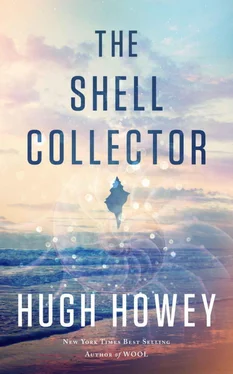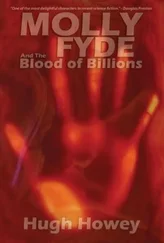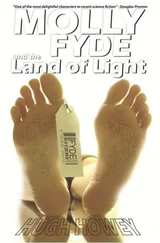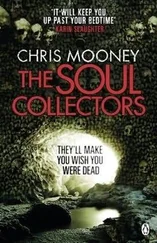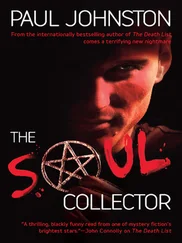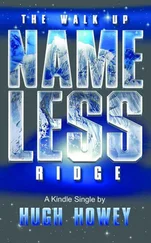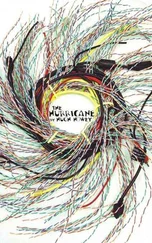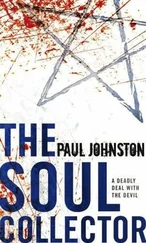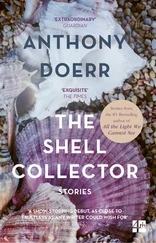“Wow,” Ness says. “That must be awful, having people think something about you that isn’t true. I can’t imagine.”
I start to ask him to elaborate, when I see him staring past my shoulder. I turn to find Holly standing at the end of the breezeway.
“You guys aren’t in love with each other,” she says.
“I’m a reporter,” I tell Holly. “I told you, I’m here to do a story on your father.”
Her lip quivers. I can see the joy from earlier in the day drain from her face. Without a word, she turns and runs down the hall, and I hear Ness curse under his breath. I start to follow Holly to her room, but Ness tells me I’m better off leaving her alone.
“She was bound to find out,” he says. “Don’t make it worse for her.”
I have no idea what this means. And I don’t see Holly again as I gather my things down at the guest house—using an oversized rain jacket and umbrella this time. I bring my solitary bag up to the house, and Ness leads me to the front door.
There’s a helicopter outside. The pilot tells Ness that we should go before the next squall hits. And maybe it’s the rain, maybe it’s not getting to shell that day, maybe it’s the lingering soreness from seeing Holly so upset at us, but the week has taken a turn. The joy is no longer on Ness’s face. And I remember what Victoria said about that smile being his shell, that he is not a happy man, and perhaps this is my first glimpse of the true Ness Wilde. Either way, the week threatens to become one of those bright, half-buried horse conchs that you reach for only to discover that the rest of the shell is missing, that there was nothing priceless about that find after all.
I’m glad I amended Ness’s packing list and brought a book. My phone doesn’t work for much of the helicopter ride, and then we land at a small airport and transfer to a private jet. Once we break above the rain clouds, I can tell by the setting sun to our right that we are flying south. Ness is pensive and quiet. I attribute this to conflicts with his ex or his daughter, but it also occurs to me that he left in a hurry that morning to tend to an emergency. Perhaps it’s something else entirely.
Rebelling against my reporter DNA, I decide to let it go and to lose myself in the book I brought along. Treasure Island was losing me, felt more like a romp a young boy might like, so I picked out Moby Dick instead, which I vaguely remember not-reading in college and instead using online notes to squeak out a B or a C on some paper. Little did I know all those years of bullshitting my way through coursework would nicely prepare me for a career in journalism. As it turns out, it pays pretty well to make up entire stories on slivers of fact.
I read for a few hours, and then the copilot comes back to serve us a meal. After the trays are taken away, I rejoin Ishmael on his whaling adventures, but I’m only half present in the book. My mind flits. The article I’ve written about Ness bends and sways like a tree in a shifting breeze. Somehow, two years of work now feels… unimportant. Trivial. I remind myself that vacation does this to priorities, and the past few days have been like a vacation. When I get back to New York—among the symphony of sirens and car alarms and shrieking subway rails—I will remember what’s important. That’s when the story will coalesce and take shape. It’ll be easier to update my piece about Ness when he’s not sitting across from me, staring at his laptop, scrolling but not typing, reading something with a frown. It’ll be easier when I’m not thinking about Holly, and the way she looked at me, both in joy that morning, and in anger the last time I’m likely to ever see her.
Maybe it’s meeting Holly that’s made the article difficult to ponder. It’s easier to demonize a man than it is a father, especially one who begs for hugs and leaves lights burning even when she isn’t home to use them. Getting to know Ness as a person has been a mistake, rather than a boon for my piece. The issues I want to write about are larger than one man, larger than any of us; they concern the entire globe; they concern our environment, our politics, our collective choices. Tearing him down felt good before. Now it feels hollow. I imagine this is how Ahab might’ve felt if the book in my lap had turned out differently.
I drift off in my seat thinking of white whales, of ghosts who haunt us, of the destructive forces in our lives. I think how we are often that force, chasing what we should leave alone, what we should simply let go. But letting go is harder than destroying ourselves and those around us in a mad chase to feel… right with the world. Losing our child was this thing for Michael and me. We tried too hard to replace her. And when we couldn’t, there was nothing left to salvage. It was that white whale or nothing. There was no in-between where we might survive. Where we might not drown.
Turbulence wakes me. I find a blanket tucked around my shoulders, my book set aside. Ness glances up from his laptop. The cabin lights are dim, his face cast in a pale glow from the screen.
“Another couple of hours,” he says softly.
“Where are we going?” I murmur.
“Middle of nowhere,” Ness says. “The last place anyone thinks to look.”
I try to fall back asleep, thinking on this and other puzzles. Half the time when I crack my eyes, Ness is staring at his screen. The other half of the time, he’s staring at me. The darkness, the shuddering of the plane, the cabin to ourselves, my sleepy brain, a morning spent with his daughter, his pensive mood, all swim around me. An old memory returns—a collection of disjointed memories—all the impossibly long nights spent awake at summer camp, confiding to strangers in whispers for hour upon hour, never wanting to sleep, and falling for other girls my age with reckless speed, promising each other we’d be best friends forever.
“We had a daughter,” I say, out of nowhere. I leave my eyes closed. The darkness is a safe place.
Ness says nothing.
“She came premature, and they couldn’t save her.”
I dab at my eyes with the blanket, and Ness’s seat squeaks as he adjusts himself. I feel his hand on my foot. A friendly gesture. “I’m sorry,” he says.
“It’s just that… I would love to have a daughter who hates me,” I say. And I find the courage to open my eyes. Tears stream down my neck. I wipe them away as quickly as they come. I’m trying to make him feel better, but I’m making us both feel worse.
“It’s just a phase kids go through,” Ness says. “Everyone assures me she’ll grow out of it.”
“You could wait for her to grow up, or you could meet her halfway,” I say.
“I try.” Ness closes his laptop, leaving us to the dim emergency lights. “I only get her every other weekend, and her mom often schedules camps and sports to fill those up. I’ve watched her grow up from the bleachers.”
“Does she take to strangers easily? Because she…”
I don’t know how to say what it felt like for her to bond with me so quickly, that it was part flattering and part sad.
“I saw the two of you napping in the guest house,” Ness says. “Does she do that sort of thing a lot? Maybe not that exactly, but she does like it when I’m seeing someone. And she’s always crushed when they don’t stick around.”
“They,” I say.
“People I’ve dated since my wife left me.”
“They don’t stick around, or you don’t have them back?”
Ness shrugs. “It’s complicated. What’s funny is that I think Holly just wants me to be happy. I think it’s selfless on her part, that she wants some fairy tale for me, not for her.”
“Why does she think you’re not happy?” I ask.
Читать дальше
